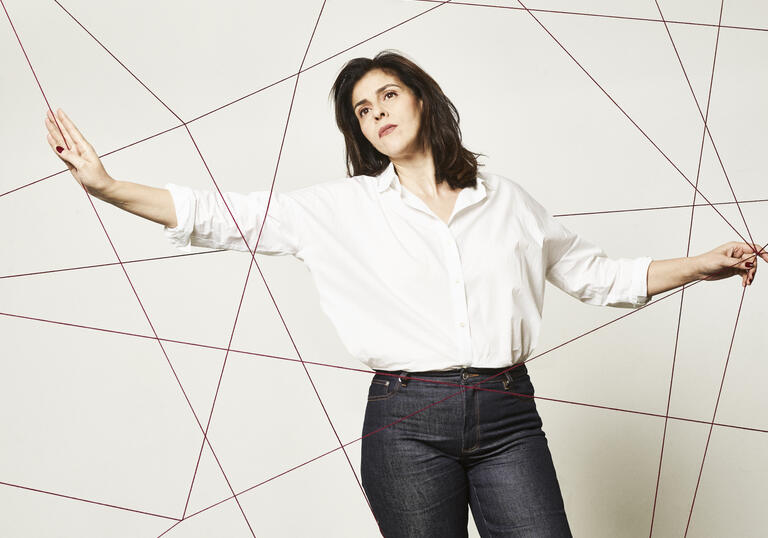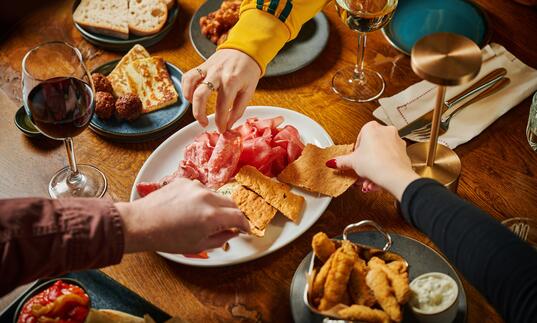Souad Massi + Ruba Shamshoum

Robin Denselow sits down with Algerian singer-songwriter Souad Massi to talk origins, influences and new beginnings through the art of her music.
Souad Massi became an international star thanks to her exquisite, often gently sad-edged blend of lyrics in Arabic, French and the American country and folk influences that have, she says, ‘been my first love from since I was young until now.’ As a singer-songwriter and musician based in Paris, there is also an echo of chanson in some of her work, and reminders that she studied classical music, listened to local styles, and played flamenco and rock back home in in Algeria before she was forced to leave. It’s an intriguing fusion and she expands her range further with the songs from her new album Sequana, which she’ll be performing on Saturday 29th October.
Sequana is a brave, defiant album, both in terms of Souad’s lyrics and the music. She has been through a difficult period in her life, she says, and the new songs are concerned with survival and hope for a better future. The title track is named after the Gallo-Roman goddess of the river Seine, who was also the goddess of healing. It was written for her daughters who are ‘afraid of the future, worried and angry… I say to them, “you have to be optimistic”.’ She is, she says, ‘concerned with what is happening in the world – a lot of people are angry. I feel we are all prisoners…the world is fragile and I’m afraid for the future of our children.’ But her new song ‘Dessine-Moi Un Pays’ (Draw Me A Country) expresses hope for a land with ‘no corrupt rulers and no evil wars,’ but is also a song about refugees, influenced, by her own experience of leaving Algeria. Other new songs include ‘Victor’ (Le Son De La Main), a tribute to the great singer-songwriter Victor Jara, tortured and killed by the Pinochet regime in Chile in 1973. In complete contrast, there’s ‘a droll, funny song about divorce – no, it’s not about me, it’s about a friend of mine.’
Then there are the real surprises. There’s a re-working in Arabic of ‘Hurt’, the intense and pained song by Trent Reznor that became a country classic when sung by Johnny Cash, which begins with ‘I hurt myself today, to see if I still feel.’ Souad says, ‘it’s beautiful poetry. There are a lot of things I can’t express myself, so I say it in this song…a lot of people hurt me.’ Even more startling of all is ‘Twam’, a song by Souad about schizophrenia and a woman for whom ‘madness has overtaken reason.’ It’s a furious, pounding piece, unlike anything Souad has done, with guitar backing from Justin Adams, who produced the album and plays on most of the tracks. His extraordinary career has included production work for Malian desert-blues exponents Tinariwen, playing guitar for Robert Plant, and winning awards for his work with Mauro Durante. A great fan of Algerian music, Justin says his role was to ‘colour the whole thing’ and help Souad as she explored influences that range from North African, to bossa nova. Souad described Justin as being ‘like fresh air.’ He will be joining her and her band on stage tonight and is ‘hugely looking forward to it.’ He's a great admirer of the ‘amazing’ Malik Kerrouche, Souad’s guitarist.
It’s another development in what’s been an intriguing career. Souad is a Berber, a descendant of those who lived in North Africa before the arrival of Islam. Brought up in Algiers, she studied town planning, but also classical music, and at night played with a flamenco group and rock with a garage band named Atakor. She wrote her first song ‘Raoul’ when she was seventeen ‘and sang it to my mum and sisters in the kitchen.’ My mum said she liked it and said, ‘perhaps you should write another.’
This was a time of Civil War in Algeria, following the cancellation of the 1992 election which it seemed the fundamentalist Islamic Salvation Front would win. The fundamentalists didn’t approve of pop music, let alone female singers, and Souad’s activities put her at risk. ‘It was dangerous, more than I realised. I had threats on the telephone and was afraid. I don’t know who called me, but they said, “we know where you live”. I was suffering from terrorism in my own country.’
In 1999 she was invited to perform in France, sang at the Femmes D’Algerie festival and was signed to a major record label, ‘it was like a dream,’ she says. Her early albums Raoul and Deb brought her success, and she has built up a strong following across Europe and America as well as North Africa and the Middle East. Her most recent albums included El Mutakallimûn, in 2015, in which she responded to the rise of Islamic State with a reminder of the creativity and tolerance of the earlier Muslim civilisations, along with echoes of the idealism and anger that fuelled the Arab Spring. Her last album Oumnia was nominated for a Songlines award. Now comes Sequana, her collaboration with Justin Adams. This promises to be a memorable concert.
Produced by the Barbican
Details
Hall
Location
The Barbican Hall is located within the main Barbican building. Head to Level G and follow the signs to find your seating level.
Address
Barbican Centre
Silk Street, London
EC2Y 8DS
Public transport
The Barbican is widely accessible by bus, tube, train and by foot or bicycle. Plan your journey and find more route information in ‘Your Visit’ or book your car parking space in advance.
We’ve plenty of places for you to relax and replenish, from coffee and cake to wood-fired pizzas and full pre-theatre menus
Mobility
Spaces for wheelchair users in row U at the rear of the stalls (up to sixteen, depth of row 180cm) and the back row of the circle (four), both with fold-down companion seats. Some seats in row S of the stalls for people with very limited mobility.
Assistance dogs
Assistance dogs may be taken into the concert hall where there are a limited number of suitable seats in row G of the stalls. If you prefer, you may leave your dog with a member of the cloakroom staff during the performance.
Hearing facility
There is an induction loop in the concert hall. You can use this by adjusting your hearing aid to the ‘T’ setting.
Free large-print programmes
These are available for most of our concerts. Please contact [email protected] at least a week beforehand, to prebook a large-print programmme.
For more access information, please visit our Accessibility section.





